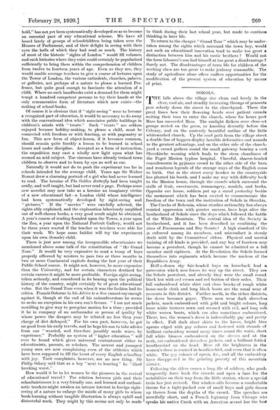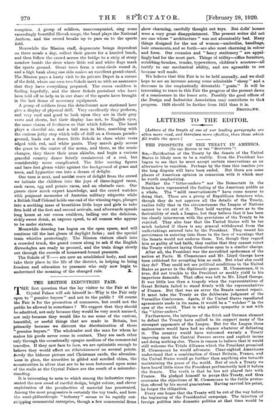SOKOLS.
THE hills above the village rise clean and lovely in the clear, cool air, and steadily increasing throngs of peasants pass soberly down the street to the churchyard. There the great limes bow their flowering heads over patient crowds waiting their turn to enter the church, where for hours past Mass has succeeded Mass. The sunlight flickers over close-set groups seated on the grass, or kneeling devoutly before the Calvary, and on the austerely beautiful outline of the little whitewashed church. Up the road path from the village street a double line of beggars display horrible deformities and wounds to the greatest advantage, and on the other side of the church- yard a crowd gathers round the small gateway bearing a curt Slovakische warning which leads to the stern cleanliness of the Paget Mission typhus hospital. Cheerful, shaven-headed convalescents in pyjamas crowd to the other side of the bars, and wondrous legends of the strange ways of the English come to birth. Out in the street every hawker in the countryside has planted his booth, and I make my way with difficulty back to the Mission house, through the crowds which surround the stalls of fruit, sweetmeats, ironmongery, sandals, and books. Opposite our house, soldiers put up a stand yesterday beside the meaument which has been -erected to commemorate the freedom of the town and the institution of Sokols in Slovakia.
The Czechs of Bohemia, whose sturdier nationality has always resisted oppression with greater success, have kept alive the brotherhood of Sokols since the days which followed the battle of the White Mountain. The central idea of the Society is brotherhood, and it has been described as combining the aims of Freemasons and Boy Scouts ! A high standard of life is enforced among its members, and misconduct is sternly dealt with by the Committees' elders. Physical and mental training of all kinds is provided, and any boy of fourteen may become a postulant, though he cannot be admitted as a full member until eighteen. At the Revolution the Sokols formed themselves into regiments which became the nucleus of the Republican Army.
Half-a-dozen shy fair-headed boys on horseback lead a procession which now forces its way up the street. They are the Sokols postulant, and already they wear the small round black hat with red crown and red button of their order. Their full embroidered white shirt and close brooks of rough white home-made cloth and long black boots are the usual wear of Peasants in this district. Further north, in the richer districts, the dress becomes gayer. There men wear dark sleeveless jackets, much embroidered with gold and bright colours, long loose white trousers sewn and seamed with red, and long soft white woven boots, which are also sometimes embroidered. There, too, the women's dress is indescribably gay and pretty in effect. Full dark short skirts to the knees, bright blue aprons edged with gay colours and fastened with strands of brilliant embroidery wound many times round the waist, short full white blouses embroidered on the sleeves and at the neck, art-embroidered sleeveless jackets, and a brilliant folded handkerchief on the head. Here all the brightness in the women's dress is centred in headkerchief, and even that is often white. The gray colours of apron, &c., and all the embroidery have diseppeared in the grinding poverty of this mountain district.
Following the riders comes a long file of soldiers, who good- temperedly force back the crowds and open a lane for the notabilities on their way from the little station, where a special train has just arrived. Our window-sills become a comfortable throne for a tight-packed row of small boys and girls drawn up thence from the depths of the crowd. The speeches are mercifully short, and a French legionary from Chicago who speaks his native Czech with an American accent has the best
reception. A group of soldiers, unaccompanied, sing some exceedingly beautiful Slovak songs, the band plays the National Anthem, and the crowd breaks up to pass on to the sports field.
Meanwhile the Mission staff, degenerate beings dependent on three meals a day, collect their guests for a hurried lunch, and then follow the crowd across the bridge to a strip of stony meadow beside the river where little red and white flags mark the sports ground. Great trees form a semi-circle round it, and a high bank along one side makes an excellent grand-stand. The Mission pays a hasty visit to its private Depot in a corner of the field, where our own two Sokols meet us with an assurance that they have everything prepared. The cocoa cauldron is fizzling hopefully, and the three Sokols postulant who have been told off to help us in our share of the sports have brought in the last items of necessary equipment.
A group of soldiers from the detachment now stationed here give a display of physical drill. Very excellently they perform, and very cool and good to look upon they are in their grey vests and shorts, but their display has not, to English eyes, the same charm of freshness as that which follows. The band plays a cheerful air, and a tall man in blue, marching with the curious jerky step which tells of drill on a German parade- ground, leads out a dozen little Sokols in close white vests edged with red, and white pants. They march gaily across the grass to the centre of the arena, and there, as the music changes, they throw their arms akimbo, and begin a curious graceful country dance faintly reminiscent of a reel, but considerably more complicated. The lithe moving figures and bare feet gleam white against the background of grass and trees, and hypnotize one into a dream of delight.
Our turn is next, and amidst roars of delight from the crowd we initiate the children into the joys of three-legged races, sack races, egg and potato races, and an obstacle race. Our guests show much expert knowledge, and the crowd watches with poignant memories of Austrian military etiquette while a British Staff Colonel holds one end of the winning-tape, plunges into a seething mass of breathless little boys and girls to take firm hold of the first and second arrivals, and afterwards spends long hours at our cocoa cauldron, ladling out the delicious, sickly sweet drink, at express speed, to all comers who appear to be under sixteen.
Meanwhile dancing has begun on the open apaoe, and will continue till the last gleam of daylight fades ; and the special train whistles protestingly. The Mission visitors climb into a crowded truck, the guard comes along to ask if the English Herrechoften are ready to proceed, and the train drags slowly out through the crowds of homeward-bound peasants.
The Sokols of T— are now an established body, and must take their place in the life of the district, in helping to bring freedom and education to peasants who only now begin to understand the meaning of the changed rule. X.



































 Previous page
Previous page